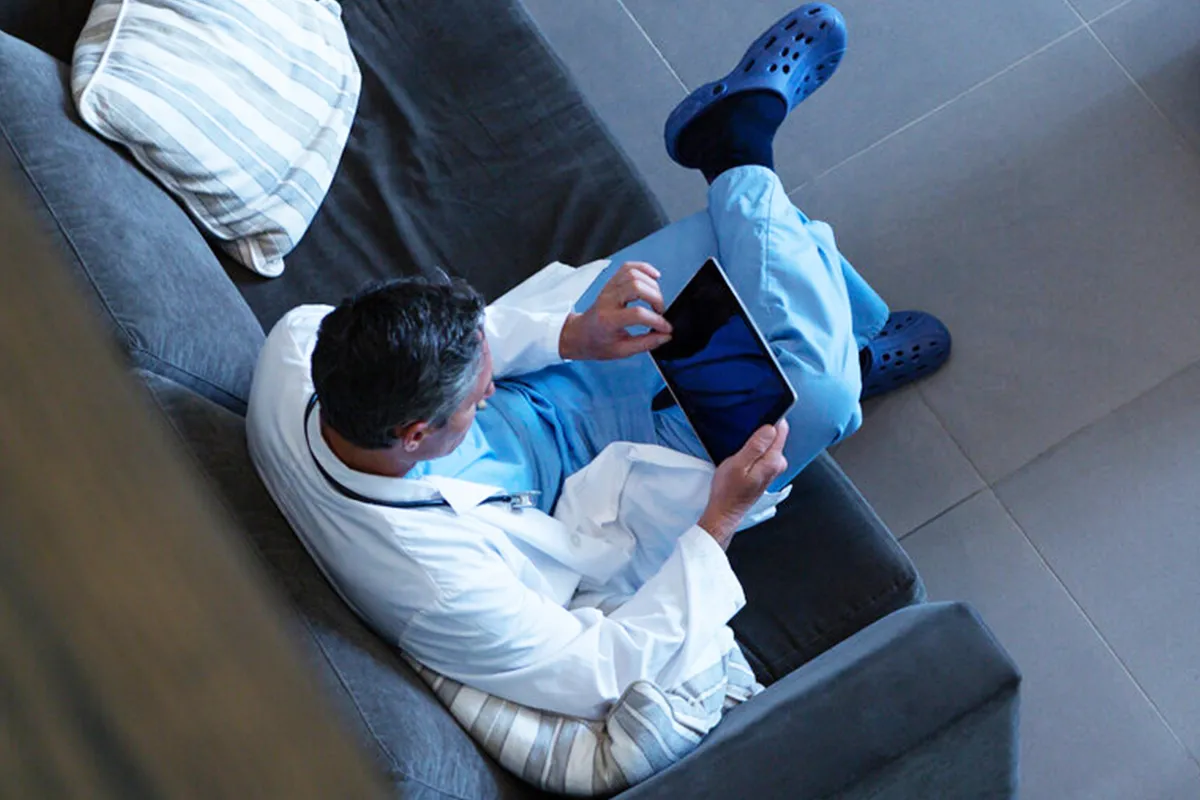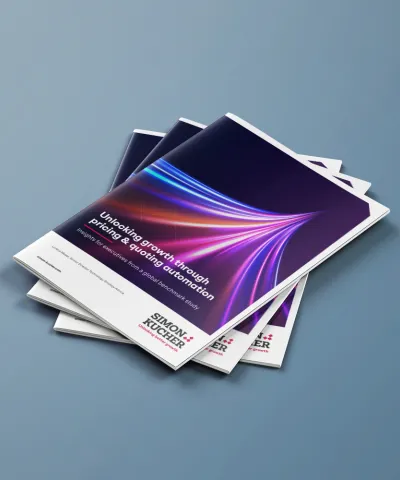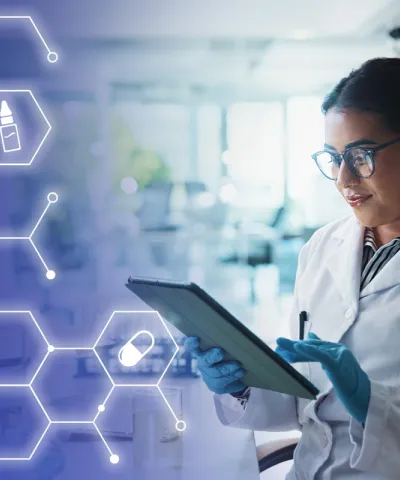ChatGPT has taken the world by storm since its launch in November 2022, sparking wide discussion across social networks, web forums, and the media about its potential to disrupt industries and the way we live. While the healthcare industry is catching up with advances in technology, is it ready for ChatGPT? We look at this powerful chatbot and other AI-powered tools through the physician, patient, and company lens.
In our recent article, we described a drive toward faster, more proactive, more agile healthcare. We also discussed how, as part of a better health trend, patients will gain more ownership of their own health while doctors better understand diseases through the right tests and tools. So, will one of these tools be ChatGPT? Potentially – but only with sufficient guardrails and sanity checks.
How will physicians use ChatGPT and other AI tools?
In March 2023, OpenAI unveiled the newest version of its language model systems, GPT-4, which now accepts visual inputs. For physicians, this development is highly relevant: AI algorithms could help to identify patterns and abnormalities not visible to the human eye when analyzing images like X-rays, MRIs, and CT scans. This is just one example of how AI could improve accuracy in medicine and speed up the diagnostic process, leading to earlier intervention, more accurate diagnoses, and improved outcomes for patients.
In a supportive function, ChatGPT can act like an assistant who unburdens physicians from administrative tasks, so they have more time to focus on the patient. Tools based on similar AI technology will play an even bigger role, helping physicians to make diagnoses, decide on treatments, as well as support their education and continuous learning. This will be an even greater game changer than the admin relief.
Respondents of our recent LinkedIn poll agree. When we asked which part of healthcare and disease management will be most affected by AI technologies such as Chat GPT, the majority (43%) voted for the category “Prevention of diseases.” Respondents also recognize this potential in acute disease treatment (23%) and chronic care management (28%). Five percent voted for the category “other.
The physician will of course be required to conduct a sanity check and make the final decision: When taking the Hippocratic Oath, a physician pledges to “practice medicine with integrity, humility, honesty, and compassion.” An AI tool can take no such oath. So, we don’t see AI-powered tools being used as a substitute for professional medical advice or care. Rather, we expect the systems used by physicians to be based on technology like ChatGPT and GPT4, but in a confined data space and with specific guardrails, ensuring confidence that the technology delivers accurate replies and assessments.
Imagine an AI tool – that has been extensively trained, tested, and fed with the right input. A physician selects the symptoms and medical indications, then AI combines this knowledge with evidence and best practices, and potentially even case-specific factors like the patient’s medical history, the capacity of emergency surgery rooms/staff, and available medications. Based on all of these factors, the tool identifies the ideal treatment for the exact situation in the given space and time. This is a major enhancement to the physician’s own extensive skills and eliminates the potential for mistakes that could be made based on human error or bias. Over time, medical chat bots will learn to interact better with each individual physician, becoming more effective as usage increases.
Are ChatGPT and other AI tools good for patients?
In a world where people happily turn to social forums for advice about their health-related problems, it’s likely that ChatGPT will be inundated with medical queries in the coming years. More anonymous, more immediate responses, less judgement – chatbots seem to offer everything the modern patient is looking for.
AI, through tools such as chatbot API, will become an important source of information, especially in countries where access to a doctor is not always a given, or in countries with high out-of-pocket healthcare costs. But where physicians and pharmacists are available, we expect medical professionals to remain the gatekeepers.
Moreover, in the same way that humans need water to survive, AI models need high-quality data. While publicly available clinical evidence can be used to build and train AI models, and patients’ health questions can be used to prompt a response, real-life public health data should be provided to get the most effective, reliable, and personalized results (e.g., the current level of COVID-19 infections in the local area.) The icing on the cake would be to integrate personal health tracking data, such as from wearables.
High-quality is the keyword here. If the data used to train an AI algorithm is biased, the resulting recommendations will likely be biased too. Healthcare organizations may also unintentionally introduce bias into their tools e.g., through studies that only include patients from certain age groups or socioeconomic backgrounds, or through the patients themselves, e.g., unwillingness to report certain symptoms. It’s crucial to first identify and mitigate bias in the data to ensure outcomes that are accurate and equitable.
What opportunities and challenges does ChatGPT create for companies?
“Chat GPT, how do I get my over-the-counter product to appear in your answers?” This is what we asked the language generation model, and it happily obliged with an answer:
- “Companies should use clear and concise language that is easy for ChatGPT to understand.”
- “Information that is accurate, up-to-date, and supported by scientific evidence will help ChatGPT provide reliable answers.”
- “Using relevant keywords and phrases increases the chances of appearing in answers by ChatGPT.
- “Providing links to additional resources, such as product websites or informational articles, helps ChatGPT generate more comprehensive and accurate answers.”
Few OTC products today are marketed with AI chatbots in mind. In general, companies will need to adapt their marketing strategies to be more consumer focused. ChatGPT makes this even more important for those that want to be reflected in chatbot results.
Perhaps even more crucial, though, is the increased transparency that Chat GPT brings. CHC companies will need to harmonize their strategies across all markets as differences in product names, ingredients, dosages, and pricing across countries become visible to customers. Here it’s essential to ensure consistency, with streamlined processes for adapting materials to different markets. Only this way can CHC companies build trust with consumers and enhance their global reputation.
Conclusion: An AI a day won’t keep the doctor away
In the words of Roy Amara: “We tend to overestimate the effect of a technology in the short run and underestimate the effect in the long run.”
We don’t see ChatGPT replacing human healthcare professionals just yet. Rather, it will complement their expertise – improving patient outcomes and unlocking better health for everyone.
ChatGPT can help physicians to make diagnoses, decide on treatments, and ensure evidence-based decision making, as long as it comes with the right guardrails and unbiased training data. In developed regions, integration of personal health tracking data can enhance the patient experience, while in less developed regions, it can open up better access to healthcare. Of course, supported by strong risk assessment and mitigation.
There is growing recognition of the benefits of AI in healthcare, and many organizations are investing in new technologies to improve population health and wellbeing. As technologies like ChatGPT continue to evolve and become more sophisticated, we will likely see increasing adoption of similar tools in healthcare systems.
Better health: We’re here to help
At Simon-Kucher, we’re excited about the countless innovative trends, technologies, and treatments and their potential to disrupt healthcare for the better. We also know that use of AI requires sufficient knowledge and guardrails. Our extensive experience in healthcare and life sciences combined with our digital consulting expertise puts us in the perfect position to connect the dots between AI and healthcare.
Interested in using generative AI to optimize your commercial activities? Here’s how we are already supporting our clients:
- Gross-to-net optimization projects: We work with pharma and healthcare companies of all kinds, helping them to identify the levers that truly impact growth. Thanks to our projects, our clients can use AI technology to analyze text heavy commercial contracts, map and benchmark relevant conditional elements, vet against internal policies, and identify optimization opportunities. Learn more
- Revenue growth management (RGM) projects: We work with consumer healthcare companies to personalize their promotion activities, using generative AI to understand consumer behavior and preferences and identify the most powerful messaging.
- Global value communication and clinical trial set-up: We use generative AI in projects with pharma manufacturers by analyzing learnings from previous clinical trials, HTA assessments, and information about market access regulations and payers.
- Sales excellence: We support healthtech manufacturers by using generative AI to determine “best next actions” in HCP engagement.
Trending Topic
Better Health
We help you to unlock better health for everyone. We see opportunity for the industry to deliver even more value by maintaining and improving health, going beyond just treating it.








